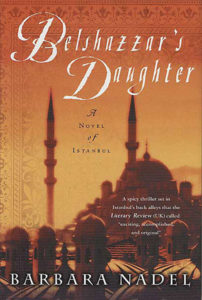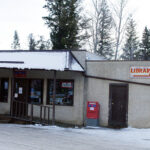Home »

Belshazzar’s Daughter is an ambitious work
Book Review
By Derryll White
 Nadel, Barbara (1999). Belshazzar’s Daughter.
Nadel, Barbara (1999). Belshazzar’s Daughter.
This is Barbara Nadel’s first published novel. Set in Istanbul, this book is a baroque ramble through on of the world’s beautiful, exotic old cities. Nadel’s I pride of place makes the reader think of Donna Leon, Michael Dibdin and Martin Walker, all writers who build their stories around the intimate excitement of a far-off region.
The author introduces Inspector Çetin Ikmen, a delightful chain-smoking character with a huge family and Fatima, a seemingly always pregnant and devoted wife. Ikmen, a Muslim, also has an unquenchable thirst for brandy. He is a reasonable and deductive spirit susceptible to infusions of other-worldly insight. In all, Ikmen is the perfect character to carry this wide-ranging story. Since this novel Nadel has published 20 more in the Ikman series and 10 more in two other series. In her flagship works Inspector Ikman is a detective on the Istanbul police force in Turkey.
Barbara Nadel wanders through the far reaches of history, exploring the depths of Imperial Russia and the Ottoman empire, which gave way to modern Turkey. She does it all in seamless fashion, leading the reader to explore the complex relationships of people to culture and men to women.
Nadel is sensitive to the conditions, the poverty and the small blossomings of joy in the Balat ghetto. She imbues the stark environment with a beautiful humanity. And as she builds the characters she also builds the textures, flavours and smells of Istanbul. The place becomes a major character in the story.
This story twists and turns as much as the ancient back alleys of Istanbul. Reaching back to the Russian Revolution and leaping forward to Nazi Germany, the author keeps the reader alert and busy following interwoven plot lines, demanding attention to both intent and detail.
‘Belshazzar’s Daughter’ is an ambitious work. It is psychological in its approach without being overly analytical. The author certainly establishes Inspector Ikmen as a character of note and interest, and she takes the trouble to develop a large supporting cast, including Ikmen’s huge personal family.
I liked this novel. Nadel makes Turkey alluring, a place it would be interesting to visit. She establishes Ikmen as a non-conforming hard drinker in a Muslim world, but as a man who nevertheless belongs. I will certainly pursue this series further as time permits.
********
Excerpts from the novel:
 TURKEY – Balat. He tramped its filthy streets, in winding labyrinthine alleys, six days a week, but it never bored him. Dickensian charm was what this district possessed. David Copperfield, Pip, Mr. Jingle, Fagin: none of them would have been out of place within Balat’s ambience of poverty, petty crime and picturesque filth. Fagin, especially, would have fitted in perfectly. Jews, old Jews, were the one and only commodity that Balat could boast of having in anything approaching abundance.
TURKEY – Balat. He tramped its filthy streets, in winding labyrinthine alleys, six days a week, but it never bored him. Dickensian charm was what this district possessed. David Copperfield, Pip, Mr. Jingle, Fagin: none of them would have been out of place within Balat’s ambience of poverty, petty crime and picturesque filth. Fagin, especially, would have fitted in perfectly. Jews, old Jews, were the one and only commodity that Balat could boast of having in anything approaching abundance.
INSPECTOR IKMEN – It wasn’t fair. A devout Muslim wife and mother saddled for all eternity with a drunken, largely absent policeman. But it wasn’t all bad. Çetin picked up his bottle again and smiled. There were eight Ikmen children – so far – with another due in a few weeks’ time. Philosophical differences aside, this was a good marriage, characterised by both love and passion.
TURKISH JEWS – They blended. Suspicious of strangers, and a perceived outside world that largely hated them, they would turn their faces to the wall as he approached and disappear into the brickwork, the concrete, the stone. For centuries the Ottoman Empire, now the Turkish Republic, had provided a safe haven for Jews. It was famed for its humane attitude toward the Hebrews. But old, suspicious habits, learned in the hard schools of Western Europe die hard. It wasn’t personal.
CHANGE – Turkey was such an outpost of the Christian world he had often thought that it could not be easy. But then was it easy for anyone? Strange fierce-eyed men with beards had been seen on the streets for some time now. Many of them came from the east and the doctrine they preached had little to do with the traditional tolerance the natives of Balat had come to expect. All over the world, it seemed, people were embracing extreme ideologies again, willingly. War in Yugoslavia; Fundamentalist violence in Egypt; the resurgence of Fascism in Germany. Manifestations of this last phenomenon had even appeared on their own doorstep.
INSPECTOR IKMEN – It was at times like this that Çetin wished he had an ordinary job; in a bank, driving taxis, hotelier – anything except police inspector. BUT THEN, REALISTICALLY, WHAT ELSE COULD HE DO? After twenty-two years on the force, it was no longer just a job. Like smoking or drinking, it was a habit, an addiction, an essential part of him. Giving up would mean painful withdrawal symptoms. He moved, blinking painfully, into the kitchen.
HATE – ‘Hate in endemic to the human race. I thought you knew that.’
ARMENIANS – “What, kismet? I don’t think we have any thinking as such. We’re Armenians, hated infidels, outsiders, there’s never been enough time to philosophise. Too many people trying to kill us, just like the Jews, in fact. Grab your wife’s jewellery, hope for the best, and run like the Devil’s on your tail!’
POVERTY – ‘She’s an old prostitute, you know. Lots of them round here. But then that’s in the nature of poverty, isn’t it? The degradation of the Self.”
RELATIONSHIPS – Being in love with someone is not easy. In the early stages of a relationship there is a lot of uncertainty, a lot of nervous tension. Will your lover meet you? Will she phone? Is the attraction mutual or are you just a meal ticket?” Unfortunately, even when the relationship matures, the problems do not go away. They take on new and, if one is not too careful, even more destructive forms. Familiarity can often breed suspicion.”
DENOUEMENT – The noise of their crying and screams filtered through the temporary stop his mind had put inside his ears. They’d come to see a drama and had found themselves inside a horror. They were seeing just the edge of the blackness that had tortured his soul since the beginning of the Meyer affair: the past crashing bloodily into the present.
 – Derryll White once wrote books but now chooses to read and write about them. When not reading he writes history for the web at www.basininstitute.org.
– Derryll White once wrote books but now chooses to read and write about them. When not reading he writes history for the web at www.basininstitute.org.







